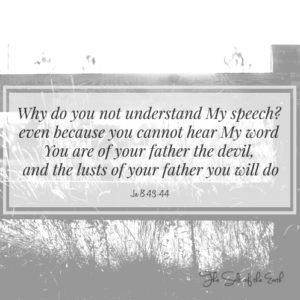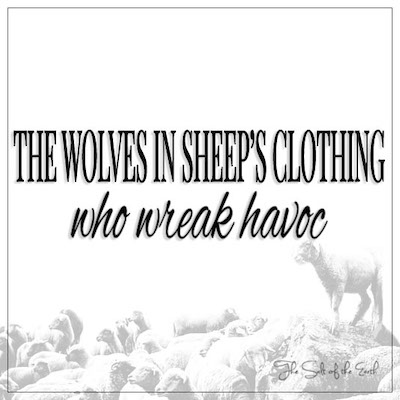The church has developed an image, that all the (religious) leaders of God’s people; the scribes, Pharisees, and Sadducees, were bad and overwhelmed God’s people with all kinds of rules, laws, rituals, jsb. which were not according to the will of God. As soon as certain subjects or matters are discussed in the church, that involve things, which are described in the Word as sin and go against God’s will, immediately the scribes, Pharisees, and Sadducees are mentioned and they say that Jesus confronted them with their religious behavior and doctrine. Because of that, many churches have allowed and accepted sin in the church. But is this true? Why did Jesus confront the religious leaders of God’s people? What was wrong with the leaders of God’s people? And what about the current leaders of God’s people; the leaders of the Church? Do they differ that much from the religious leaders in Jesus’ time? Or do they have more in common than Christians think? What are the similarities between the religious leaders of God’s people then and now?
What does Jesus say about the doctrine of the scribes and the Pharisees?
Then spake Jesus to the multitude, and to his disciples, Saying, The scribes and the Pharisees sit in Moses’ seat: All therefore whatsoever they bid you observe, that observe and do; but do not ye after their works: for they say, and do not. For they bind heavy burdens and grievous to be borne, and lay them on men’s shoulders; but they themselves will not move them with one of their fingers (Mateus 23:1-4)
According to the scriptures, there was nothing wrong with the doctrine of the scribes and the Pharisees. Because Jesus commanded the people of God and His disciples to observe whatsoever the scribes and the Pharisees bid them to observe and do. Since they sat in Moses’ seat.
Sanajan kitu, Jesus commanded them to not do after their works and to live the way they lived. Because although they preached the words of Moses, they didn’t live according to the words they preached.
And actually, in all this time, nothing has changed. Because in this time, many church leaders act piously and speak and preach pious words and advise, instruct and command the believers from the pulpit, while they don’t live after the words they preach.
Many church leaders have secret lives and do those things, which they forbid the people of God to do, since they go against the will of God.
What does Jesus say about the behavior of the scribes and the Pharisees?
But all their works they do for to be seen of men: they make broad their phylacteries, and enlarge the borders of their garments, And love the uppermost rooms at feasts, and the chief seats in the synagogues, And greetings in the markets, and to be called of men, Rabbi, Rabbi (Mateus 23:5-7)
Although the scribes, Pharisees, and Sadducees stood formally in the service of God, they didn’t serve God through their lives, but they served themselves.
They sought the attention of the people and walked in prestige. They wanted to be noticed, worshiped, and exalted by the people. Therefore they exalted themselves above the people and acted like gods. They showed off their intellect and their status. And the people admired them and put them on a pedestal.
This phenomenon still happens. People are still in awe of religious leaders. Sometimes their awe for people is greater than their awe for God.
Many run after (famous) religious leaders and worship them and place them on a pedestal. Many believe the words of preachers, pastors, theologians, priests, prophets, evangelists and teachers of the Church above the Word of God. The words, pamadegan, and experience of religious leaders are considered as the truth, even if they go against the words and the will of God.
What does Jesus say about titles?
But be not ye called Rabbi: for one is your Master, even Christ; and all ye are brethren. And call no man your father upon the earth: for one is your Father, which is in heaven. Neither be ye called masters: for one is your Master, even Christ. But he that is greatest among you shall be your servant. And whosoever shall exalt himself shall be abased; and he that shall humble himself shall be exalted. (Mateus 23:7-11)
The leaders back then were fond of titles. Since many leaders today are also fond of titles, nothing has really changed. Many still make eagerly use of titles to prove themselves and show others, who they are and what they have achieved. Because titles impress carnal people. And so many people hide behind titles.
But in reality, a title doesn’t say a thing. A title doesn’t define who you are, but only proves that you have completed a specific study and possess the required head knowledge and/or have obtained a position in the church.
But in the Kingdom of God, it’s not about titles. In the Kingdom of God it’s all about whether a person is born again sarta geus jadi ciptaan anyar and is seated in Christ and walks after the Word and the Spirit in the authority of Jesus Christ and the power of the Holy Spirit.
There are many leaders, who are appointed in the church and have the most impressing titles in front of their names and have written many books and therefore they have acquired respect and awe from people, while they don’t personally know Jesus Christ and they don’t have the Holy Spirit.
They know the scriptures in the Bible and have a wealth of head knowledge, because the paper, title(s) and the books prove it, but that’s it. Because of that, many are puffed up and prideful and have exalted themselves above others and walk in awe of the people.
That’s why many people considered Jesus not credible and turned away. Because who was Jesus of Nazareth? Jesus was the son of a carpenter, who didn’t go to college, didn’t have a degree and didn’t have titles. Therefore Jesus couldn’t do many wonders in His hometown.
The reason, that Jesus couldn’t do many signs and wonders was not because of a lack of power or the Holy Spirit. But the reason was, that the people didn’t see Jesus as the Son of God, Prophet, and Christ, but they saw Jesus as the son of the carpenter, who lived nearby and whom they had seen grown up.
Therefore not many people, who were in need went to Him. Tapi jelema, who did go to Jesus for help, were delivered and healed by Jesus (Baca ogé: ‘Why couldn’t Jesus do many miracles in His hometown?’)
What does Jesus say about the fruit of the scribes and the Pharisees?
Before Jesus appeared on stage, John appeared on stage. John the Baptist prepared the way for Jesus’ coming. He went before Jesus and called the people to tobat and the putting away of sin, because the Kingdom of God was at hand.
When the Pharisees and the Sadducees came to the baptism, John called them a generation of vipers. Because they didn’t bring forth the fruit that met the repentance.
John stood in the service of God and not in the service of people and therefore he didn’t speak what the people wanted to hear, but he spoke the words of God. John confronted these (religious) leaders and spoke hard words. He told them, that if they wouldn’t produce good fruit, they would be as a tree, which didn’t bring forth good fruit and be hewn down and cast into the fire (Mateus 3:1-11, Lukas 3:7-9).
John spoke the same words as Jesus spoke. Because when Jesus came, He spoke to the people about the strait gate and the narrow way, that would lead to eternal life and the wide gate, that would lead to destruction.
Jesus confronted and warned the people for false prophets, who would come in sheep clothing, but inwardly they were raving wolves. The only way to discern the true prophets of God from the false prophets of the devil was to look at the fruit, which they brought forth. Since a good tree can’t produce bad fruit and a bad tree can’t produce good fruit.
Every tree, that doesn’t bring forth good fruit would be hewn down and cast into the fire (Mateus 7:13-20, Lukas 6:43-45)
The priests and Pharisees didn’t produce the fruit of the Kingdom of God and therefore Jesus foretold them, that the Kingdom of God would be taken from them and given to a people, who would bring forth the fruit of the Kingdom of God (Mateus 21:43-46)
In this time, there are also many leaders, who are not willing to submit themselves to God and obey Him. They don’t walk after the Word and the Spirit and don’t bear the fruit of the Spirit. But they are carnal and walk after their flesh and bear the fruit of the flesh. They don’t live holy (set apart from the world and devoted unto God) and don’t do the works of righteousness. But they belong to the world and do the works of unrighteousness.
Although they are appointed in an office in the church and read from the Bible and act piously in front of other believers, the rest of the week they act like the world and fill their minds with the things of the world. Many walk in rebellion towards God in sin and persevere in sin and refuse to repent.
The scribes and the Pharisees shut up the Kingdom of Heaven
But woe unto you, scribes and Pharisees, hypocrites! for ye shut up the kingdom of heaven against men: for ye neither go in yourselves, neither suffer ye them that are entering to go in (Mateus 23:13).
The scribes and Pharisees were not devoted to God and didn’t know Him nor the will of God and the Kingdom of Heaven. They were seated upon the thrones of their lives and they lived according to their own will after the flesh. They didn’t enter the Kingdom of Heaven and did not allow the people to enter the Kingdom of Heaven either, but they shut the Kingdom of Heaven for them, so that no one could enter.
In this time, there are many leaders, who are appointed in the church but are not dilahirkeun deui and have not entered the Kingdom of Heaven.
They have not been transferred from the kingdom of darkness into the Kingdom of Heaven. Therefore they still belong to the kingdom of darkness (karajaan dunya).
They are carnal and from the kingdom of darkness, they raise the believers with their carnal doctrines, which derive from their carnal minds and the wisdom and knowledge of the world. Because of that, they shut the door off the Kingdom of Heaven for many people.
Their doctrines strengthen the flesh of the people and starve the spirit of the people. Instead of bearing the fruit of the Spirit, they bear the fruit of the flesh and because of that the church is full of uncleanness; sin and iniquities.
They don’t warn the people and don’t call the people to repentance and to put away sin. They don’t preach the crucified Christ, regeneration and sanctification, so that people are disimpen and enter the Kingdom of Heaven and stay in the Kingdom of Heaven.
Gantina, they allow the people to live in sin and preach lies, which prevent the people to enter the Kingdom of Heaven through the Door. Instead of leading God’s people to eternal life, they lead the people to hell (Baca ogé: ‘Many pastors are leading the sheep into the abyss’)
What does Jesus say about the scribes and the Pharisees and abusing their office?
Woe unto you, scribes and Pharisees, hypocrites! for ye devour widows’ houses, and for a pretence make long prayer: therefore ye shall receive the greater damnation (Mateus 23:14)
The scribes and Pharisees loved money and were greedy of gain. They abused their position and their office and used pious pretenses to lay hold on the widow’s possessions.
Again, in this time nothing much has changed. Many leaders love money and are greedy of gain and abuse the Kingdom of God and their position to get what they want, which is money for their own kingdom.
Some say piously, that you can’t reap before you sow. Therefore you must first sow money in order to receive prayer, breakthrough, healing, a blessing, a gift and so on.
Others promote and sell all kinds of things, which possess the power of God, like a piece of the rock of Jesus’ grave, anointing oil, irradiated water or other irradiated objects and so on. Unfortunately, many carnal believers believe their lies and spend a lot of money on this quackery.
What does Jesus say about the discipleship of the scribes and Pharisees?
Woe unto you, scribes and Pharisees, hypocrites! for ye compass sea and land to make one proselyte, and when he is made, ye make him twofold more the child of hell than yourselves (Mateus 23:15).
The scribes and Pharisees went about to make one proselyte. When they found one, they discipled the proselyte and made him twofold more a child of hell, than they were.
In this time, there are leaders, who make proselytes and followers of themselves, instead of proselytes and followers of Jesus Christ.
They teach them with their carnal wisdom and knowledge, which derive for a large part from their own (supernatural) experiences and carnal mind instead of the Word of God.
The prosperity and wealth and the signs and wonders have become the center and the Word has been pushed aside.
They don’t feed the believers with the words of God and they don’t lead them through the process of sanctification, so that they put off the old man jeung put on the new man. Gantina, they feed them with their own carnal wisdom and knowledge and teach them carnal methods, technics, and formulas to become prosperous, wealthy and do signs and wonders.
Many don’t rely on God and don’t do things from their relationship with Jesus Christ, but they rely on their own ability and speech (formulas).
Many times their lives remain the same and they stay the old creation, who walks after the flesh. The only thing that often changes is that next to their normal lives, they do signs and wonders, like prophesying, cast out demons and heal the sick. But you don’t have to be born again, to do these things (Baca ogé: ‘Do you have to be born again to walk in the supernatural?’).
But how many of them are truly sons of God and walk in righteousness after the will of God? How many have a personal relationship with Jesus Christ and spend time in prayer and in the Word with Him and the Father? How many of them go out and do the works to exalt Jesus and glorify the Father or to be noticed by the people and exalt and glorify themselves?
The gift is more important than the Giver
Woe unto you, ye blind guides, which say, Whosoever shall swear by the temple, it is nothing; but whosoever shall swear by the gold of the temple, he is a debtor! Ye fools and blind: for whether is greater, the gold, or the temple that sanctifieth the gold? Jeung, Whosoever shall swear by the altar, it is nothing; but whosoever sweareth by the gift that is upon it, he is guilty. Ye fools and blind: for whether is greater, the gift, or the altar that sanctifieth the gift? Whoso therefore shall swear by the altar, sweareth by it, and by all things thereon. And whoso shall swear by the temple, sweareth by it, and by Him that dwelleth therein. And he that shall swear by heaven, sweareth by the throne of God, and by Him that sitteth thereon (Mateus 23:16-22).
Although the people looked up to the scribes and the Pharisees and regarded them as learned and skilled people, who possessed all the wisdom, pangaweruh, and insights of God, Jesus looked at them differently. Despite all their head knowledge, Jesus called them fools, blind and blind guides.
They didn’t comprehend the Kingdom of Heaven and the righteousness and holiness of God. Since they considered the gift more important than the Giver.
In this time, there are also many leaders, who are more focused upon the gift(s) than upon the GIver. They value the gifts more, than God the Father, Yesus Kristus; the Word and the Holy Spirit.
What does Jesus say about the scribes and the Pharisees and the law?
Woe unto you, scribes and Pharisees, hypocrites! for ye pay tithe of mint and anise and cummin, and have omitted the weightier matters of the law, judgment, mercy, and faith: these ought ye to have done, and not to leave the other undone. Ye blind guides, which strain at a gnat, and swallow a camel (Mat 23:22-24).
Although the scribes and Pharisees paid their tithe, they missed the essence and the righteousness of the law. Ku kituna, they didn’t keep the commandments of God, which were important to God. They didn’t live according to the words of God and they didn’t walk in obedience to Him in His will. Because of that, they didn’t recognize and acknowledge Jesus as the Christ, the Son of the living God.
Obedience to God and His Word is more important to God than sacrifice (i.e. 1 Samuel 15:22, Paribasa 21:3)
In this time, there are also many leaders, who don’t walk in the will of God and only keep and do statutes and rituals as part of a tradition and/or before the people. They don’t know the secret of the law and don’t acknowledge the holiness and righteousness of God, because if they would, their lives would be different and they wouldn’t tolerate and accept sins and iniquities in the church. Gantina, they would hate sin and would remove the sins and iniquities, just like God, Yesus, jeung Roh Suci.
What does Jesus say about the heart and nature of the scribes and Pharisees?
Woe unto you, scribes and Pharisees, hypocrites! for ye make clean the outside of the cup and of the platter, but within they are full of extortion and excess. Thou blind Pharisee, cleanse first that which is within the cup and platter, that the outside of them may be clean also. Woe unto you, scribes and Pharisees, hypocrites! for ye are like unto whited sepulchres, which indeed appear beautiful outward, but are within full of dead men’s bones, and of all uncleanness. Even so ye also outwardly appear righteous unto men, but within ye are full of hypocrisy and iniquity (Mateus 23:25-28).
Since the people were carnal and were sense ruled, they only saw the outward appearance of the scribes and the Pharisees. They saw their pious behavior and heard their pious words and prayers and therefore they were in awe for the leaders of the people.
Although Jesus came in the flesh, Jesus was not carnal but spiritual.
Jesus didn’t walk after His senses and therefore He wasn’t led by what He saw or what He heard, but Jesus walked after the Spirit and was led by what the Holy Spirit revealed Him (Isaiah 11:1-3)
Jesus saw their true heart and true nature. Jesus saw their works, which they did in secret and were hidden for the eyes of man (the old man). But their works were not hidden before the Holy Spirit.
The Holy Spirit revealed their works and their works testified who they were, whom they obeyed, by whom they were led and to whom they belonged.
What does Jesus say about the behavior of the scribes and Pharisees regarding the prophets and the righteous?
Woe unto you, scribes and Pharisees, hypocrites! because ye build the tombs of the prophets, and garnish the sepulchres of the righteous, Jeung ngomong, If we had been in the days of our fathers, we would not have been partakers with them in the blood of the prophets. Wherefore ye be witnesses unto yourselves, that ye are the children of them which killed the prophets. Fill ye up then the measure of your fathers. Ye serpents, ye generation of vipers, how can ye escape the damnation of hell? Wherefore, ningal, I send unto you prophets, and wise men, and scribes: and some of them ye shall kill and crucify; and some of them shall ye scourge in your synagogues, and persecute them from city to city: That upon you may come all the righteous blood shed upon the earth, from the blood of righteous Abel unto the blood of Zacharias son of Barachias, whom ye slew between the temple and the altar. Verily I say unto you, All these things shall come upon this generation (Mateus 23:29-36).
In this time, the ancient prophets, apostles, martyrs, church fathers, and other famous preachers, who passed away, are being exalted and honored, while their doctrine is rejected by the doctrine and lives of the current leaders.
Jelema-jelema, who are sent by God and preach His words, are often not accepted, but instead are persecuted and rejected by the Church. They think that they honor God by rejecting them, but in reality, they serve the devil, by putting the doctrine of man above the doctrine of God and therefore allow and accept sin in the Church.
The similarities between the leaders of God’s people then and now
Just like not all the (religious) leaders of God’s people were evil, not all the leaders of the Church are evil. But unfortunately, the majority of the leaders of the church don’t submit themselves to God and don’t obey His Word, just like the scribes and Pharisees. They are not led by the Word and the Holy Spirit, but they rely on themselves; their own ability and intellect and are led by their own experiences, papanggihan, pamadegan, hikmah, and knowledge and make their own rules and regulations.
Just like the scribes and Pharisees, many have a lot of head knowledge of the written word and the commandments, but they miss the true message, the righteousness, and the experiential relationship with the living Word; Yesus Kristus.
Many are not spiritual, but carnal and have the spirit of the world. Ku kituna, they are not obedient and loyal to Jesus Christ; the Word and don’t reject the wisdom and knowledge of the world. But they are loyal to the world and compromise and build bridges with the world. They adjust the words of God to the doctrines of the world and to the lusts and desires of the old carnal man and have rejected the Word from the church (Baca ogé: ‘Jesus thrown out of the Church‘).
- They raise the children of God into children of the devil
- They lead the people of God not to heaven, but to hell
- They are not able to fulfill the need of the people, but they refer them to the world; the territory of the devil and the kingdom of darkness
- They preach their own opinions, experiences, and philosophies and add some scriptures, which many times are taken out of context
- They adopt the doctrines of other religions and eastern philosophies and preach these doctrines of the world instead of preaching the doctrine of God and His Word
- They make their own rules, instead of submitting to the rules of God
- They stand in the service of people, instead of God
- They possess the spirit of the world instead of the Spirit of God
- They are carnal and unspiritual and therefore they walk after the flesh instead of being spiritual and walk after the Spirit
- They listen to the world instead of the Word
- They obey the world instead of the Word
- They live as the world instead of the Word
- They deny Jesus and His work and persevere in sin
- They deny the Holy Spirit and His power and rely on their own ability
- They love the world and all that the world has to offer and embrace the works of the world
- They approve the works of the devil and call that, which is evil good and which is good evil
There are many more things that could be added to the list. But we can conclude that in all these years nothing has really changed in the generation of the old carnal man. As long as a person remains the old creation; the old man, the person shall show the same behavior, which is mentioned above.
Ku kituna, leaders, who are not born again and belong to the generation of the old creation (the old man) shall have the same nature and the same behavior as the (religious) leaders of God’s people, who lived in Jesus’ time.
'Janten uyah bumi’






